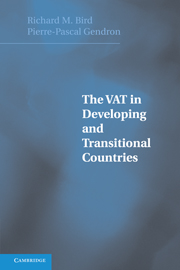Book contents
- Frontmatter
- Contents
- List of Tables
- Preface
- 1 Why This Book?
- 2 The Rise of VAT
- 3 Is VAT Always the Answer?
- 4 Trade and Revenue
- 5 Equity and the Informal Sector
- 6 What Should Be Taxed?
- 7 Key Issues in VAT Design
- 8 New Issues in VAT Design
- 9 Administering VAT
- 10 Dealing with Difficulties
- 11 The Political Economy of VAT
- 12 Where Do We Go from Here?
- Annex
- References
- Index
1 - Why This Book?
Published online by Cambridge University Press: 16 November 2009
- Frontmatter
- Contents
- List of Tables
- Preface
- 1 Why This Book?
- 2 The Rise of VAT
- 3 Is VAT Always the Answer?
- 4 Trade and Revenue
- 5 Equity and the Informal Sector
- 6 What Should Be Taxed?
- 7 Key Issues in VAT Design
- 8 New Issues in VAT Design
- 9 Administering VAT
- 10 Dealing with Difficulties
- 11 The Political Economy of VAT
- 12 Where Do We Go from Here?
- Annex
- References
- Index
Summary
Few fiscal topics are more important than the value-added tax (VAT). Over the last few decades, VAT has swept the world. With the notable exception of the United States most countries around the world now have a VAT. In many developing and transitional countries VAT is the most important single tax. But should every country have a VAT? Is the VAT in place in most countries as good as it should be in economic, equity, and administrative terms? Can it handle the fiscal tasks imposed by trade liberalization and other factors in recent years? Can it deal adequately with the novel issues arising from digital commerce and decentralization? Can it be administered sufficiently effectively by the already hard-pressed revenue administrations of developing and transitional countries?
The answers to such questions are critical not only to fiscal stability in developing and transitional countries but also to their growth and development. Are the VATs now in place in most of these countries the efficient, simple revenue-raisers they are often purported to be? Or are they so inequitable that they may exacerbate social tensions and hence undermine the political equilibrium reflected in a country's fiscal structure? Does VAT provide a feasible way to tap the informal sector? Or may it end up expanding the range of such activities? In this book we consider these and other critical questions about the design and performance of a tax that in recent years has become the mainstay of the revenue system in most developing and transitional countries around the world.
Information
- Type
- Chapter
- Information
- The VAT in Developing and Transitional Countries , pp. 1 - 9Publisher: Cambridge University PressPrint publication year: 2007
